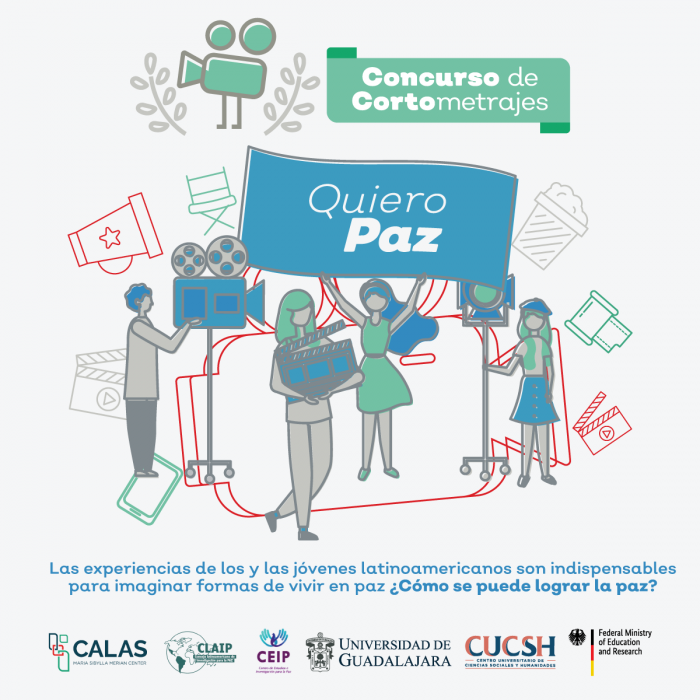In Latin America and the Caribbean, violence manifests itself in many different forms that affect particularly young people. They are vulnerable to crime and social, economic and cultural marginalization. Therefore, the experiences of young people are key to thinking ways of living without violence. The contest calls youngsters to speak out on this crisis. They are invited to express their views on the consequences of violence and, specifically, their ways of understanding possible forms of peaceful coexistence.
Elements to consider
- Local contexts: Although peace and violence are general notions that concern humanity as a whole, in each era and each region, their concrete meanings vary since problems and claims are the result of specific circumstances. For this reason, the contest calls participants to take their specific context as a starting point and to develop perspectives of peace according to their own experiences.
- Types of violence: Depending on the social and political context, the problem of violence manifests itself in different ways. Youngsters are called to reflect upon what they consider to be the most serious problem that prevents their communities from living together peacefully: Is it crime and delinquency, or is it the violence inflicted by security forces? Are past and present internal wars and conflicts between armed groups what hinders the maintenance of peace? Or is it rather structural violences, such as social inequality, gender-based violence and racism, among others?
- Paths to peace: Taking into account existing violence problems, participants are encouraged to imagine how it might be possible to live together peacefully. How is peace achieved? With justice, with memory, with reconciliation, with tolerance? How could security be achieved without oppression? What can every person do? How can we accept the other and promote their acceptance in society?
- Imaginaries of peace: Finally, peace is not just conflict resolution and the overcoming of violence. Participants are invited to think peace as something that is desirable. How do we imagine coexistence when based on respect for the integrity of every individual? What does this mean for society, the community and individuals?
The contest is organized as part of the Laboratory of Knowledge Visions of Peace: Transitions between Violence and Peace in Latin America, of the Center for Advanced Latin American Studies (CALAS). The Laboratory understands peace as a process and a transition towards less violent forms of coexistence. Peace is, in other words, not a matter of being but a matter of doing.
Contest terms
- Youngsters from 15 to 29 years old from any country of Latin America and the Caribbean can participate, individually or in groups.
- Each group or person can submit only one short film.
- Short films can be in Spanish, Portuguese, English or French.
- Participants will be divided into categories:
- Participants aged from 15 to 21 years.
- Participants aged from 22 to 29 years.
- In the case of group participation, the age of the participants will be averaged out in order to place them in one of the aforementioned categories.
Award
- Ten (10) short films will be selected as winners, each of which will receive 500 USD as reward. Each short film will receive one award.
- The awards will be distributed equally among the two age categories: five (5) for the participants aged from 15 to 21 years, and five (5) for the participants aged from 22 to 29 years.
- Another ten (10) short films will be selected, which will not receive an award but whose submitters will be granted access to the CALAS official premiere.
Specifications of the short films
- Duration of the short films: from three (3) to eight (8) minutes, including credits.
- The short film must be an unreleased piece. It must not have been previously presented in another competition or festival.
- Technical specifications of the short film: MP4 format with a minimum resolution of 1080 (HD).
- All film genres are welcome (fiction, animation, documentary, etc.).
Submission of the short films
Participants must upload the short film to an online platform such as Youtube or Vimeo, and send the link configured as private, with password or not open to the public.
Jury
The winning short films will be selected by a group of specialists and academics associated with the CALAS Laboratory Visions of Peace.
Results and awards ceremony
- The jury’s decision will be notified to the winners on May 31st, 2021.
- The jury’s decision is final.
- As a rule, the awards will only be awarded by bank transfer.
Screening
- The short films will be screened at CALAS events and will be made public through the website.
- Participants have the right to a certificate of participation.
- The directors of the selected short films must give permission to CALAS for the screening of their films in order to obtain the award. Should the participant be a minor, said permission must be given by their mother, father, or guardian.
Applications
- Participants must complete a registration form: https://forms.gle/BXzDByL1HToLx4xa6
- Participants must submit a brief explanation of the idea of the short film, indicating the age category in which they will participate.
- Minors must add to their registration form the signature and full name of their mother/father/guardian, as an authorization of their registration.
- Participants must send the short film.
Important dates
- Call for submissions: September 21, 2020, the International Day of Peace
- Closing date: February 28th, 2021
- Announcement of the winning short films: May 31st, 2021
- Award ceremony: April, 2021
- Screening of the selected short films: as from July 2021
Convening institutions
- Laboratory Visions of Peace - CALAS
- Consejo Latinoamericano de Investigación para la Paz
- Centro de Estudios e Investigación para la Paz
- Centro Universitario de Ciencias Sociales y Humanidades - CUCSH
Further information
Dr. Carmen Chinas Salazar- cortosquieropaz@gmail.com
Laboratory Visions of Peace: Transitions between Violence and Peace in Latin America


